 Back in 2004, I listened to Al Franken on Air America. For all of ten minutes.
Back in 2004, I listened to Al Franken on Air America. For all of ten minutes.
Nine years ago, I was a Republican having second thoughts about giving George W. Bush a second term. Between the failure to find weapons of mass destruction in Iraq and the over-the-top demagoguery of the Massachusetts Supreme Judicial Court's marriage-equality ruling, I found the idea of voting for Bush again distasteful.
So I decided to give Franken, the franchise player of the then recently launched Air America radio network, a chance; maybe he could convince me to vote for John Kerry. However, after ten minutes of listening to Franken and co-host Katherine Lanpher, I decided that I wasn't really the target audience. I went back to listening to Rush Limbaugh, and --- God help me --- I ended up voting for Bush again.
Looking back, I realize that I was taught to hate Franken --- and anything that wasn't right-wing radio. It's a lesson I never should have learned...
Even before Air America debuted, right-wingers were convinced it would fail --- and I was convinced that they were right. Right-wing radio star Jay Severin, then of WTKK-FM in Boston, wrote a piece for the Boston Globe just before Air America's premiere insisting that the network would abruptly fail, because there was supposedly no real market for Progressive Talk.
My ten-minute experience with Franken reaffirmed my pre-conditioned view that Air America would "die quickly", as Rep. Alan Grayson might say. A year later, a Massachusetts-based right-wing blogger named Brian "The Radio Equalizer" Maloney reported on allegations of financial impropriety at the network.
I started following Maloney's writing, much of which was spent attacking Air America's hosts and other progressive talkers for alleged offensiveness and hyperpartisanship; over the years, his targets included Randi Rhodes, Mike Malloy, Montel Williams, Thom Hartmann and Rachel Maddow. I could never figure out why Maloney devoted his blog to attacking progressive radio; after all, if progressive radio was, according to the right, a dead format that nobody listened to, why bother calling attention to it? Nevertheless, Maloney was a somewhat humorous writer, so I kept on reading.
Maloney's work convinced me to never give Progressive Talk a second chance, even as Limbaugh's program in particular became more and more obnoxious. In Maloney's world, Rhodes was a self-righteous harridan who wanted to see all conservatives drop dead; Malloy was a bitter hothead who hated capitalism; Ed Schultz supported voter fraud; and Montel Williams worshiped the ground President Obama walked on. Maloney insisted that the world of Progressive Talk radio was a dark, nasty ideological ghetto where civility and reason were routinely mugged and assaulted; not the sort of place you'd want to be.
Maloney was, of course, a big Limbaugh booster, and as I lost interest in "El Rushbo," I gradually began to lose interest in Maloney's work. Still, I was influenced by his attacks on progressive radio, and didn't start listening regularly to the medium until recently, after Brad Friedman --- who I came to know after he featured me on a June 2011 KPFK-FM "BradCast" to discuss my then recent conversion on climate change --- filled in for Ed Schultz on his nationally syndicated radio show.
Having had a chance to listen to Schultz, Hartmann and Rhodes for myself --- and realizing that they are not the verbally abusive ogres Maloney made them out to be, but civil, lively personalities who communicate their ideas with wit and style --- it occurred to me that Maloney's actual goal was to bury progressive radio in the eyes of his readers, so that they would never consider listening to the medium in the event they wanted to hear something different from the repetitive Limbaugh/Hannity stuff. Certainly, I wish that I had avoided Maloney's writings and given progressive radio a second chance in the mid- to late-2000s; perhaps I would have had an awakening on climate change prior to 2010!
The best aspect of progressive radio is that it's NOT repetitive, as opposed to copycat "conservatalk". You may recall the controversial 2008 article from Dan Shelley, the former news director of Milwaukee, Wisconsin-based WTMJ-AM, who described how the RNC would send talking points to the "conservative" hosts he worked with: the piece certainly explains why the hosts on your local wingnut talk station all seem to sound alike. I don't get the sense that anyone is telling Rhodes, Hartmann and Schultz what to say. No wonder they sound so fresh compared to what I used to listen to --- and of course, what I used to listen to continues to dominate our publicly owned airwaves, thanks to corporate consolidation and a sleeping-on-the-job FCC, as Friedman and Sue Wilson have noted here over the years.
Right-wing talk radio is very good at teaching people who to hate. Right-wing talk radio boosters such as Maloney obviously knew how to do that too. However, having listened to Schultz, Hartmann and Rhodes for myself, and realizing that Maloney falsely depicted them as foaming-at-the-mouth lunatic radicals, I realize that Maloney ultimately taught me to hate...Maloney --- and the sort of talk radio he preferred.
D.R. Tucker is a Massachusetts-based freelance writer and a former contributor to the conservative website Human Events Online. He has also written for the Huffington Post, the Boston Herald, ClimateCrocks.com, FrumForum.com, the Ripon Forum, Truth-Out.org, TheNextRight.com, and BookerRising.com. In addition, he hosted a Blog Talk Radio program, The Notes, from August 2009 to June, 2010. You can follow him on Twitter here: @DRTucker.


 Sunday 'Close Enough' Toons
Sunday 'Close Enough' Toons A Pretty Weak 'Strongman': 'BradCast' 10/30/25
A Pretty Weak 'Strongman': 'BradCast' 10/30/25 'Green News Report' 10/30/25
'Green News Report' 10/30/25
 Proposal for 'First Politically Viable Wealth Tax' Takes Shape in CA: 'BradCast' 10/29/25
Proposal for 'First Politically Viable Wealth Tax' Takes Shape in CA: 'BradCast' 10/29/25 Monster Storm, Endless Wars, Gamed Elections:
Monster Storm, Endless Wars, Gamed Elections: 'Green News Report' 10/28/25
'Green News Report' 10/28/25 Let's Play 'Who Wants
Let's Play 'Who Wants Sunday 'Cartoonists Dilemma' Toons
Sunday 'Cartoonists Dilemma' Toons Exiled NOAA Scientists Resurrect Critical Disaster Database: 'BradCast' 10/23/25
Exiled NOAA Scientists Resurrect Critical Disaster Database: 'BradCast' 10/23/25  'Green News Report' 10/23/25
'Green News Report' 10/23/25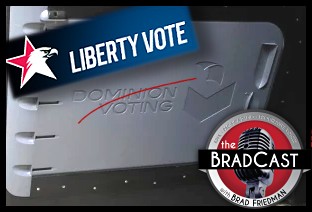 Trump-Allied GOP Partisan Buys Dominion Voting Systems: 'BradCast' 10/22/25
Trump-Allied GOP Partisan Buys Dominion Voting Systems: 'BradCast' 10/22/25 Trump, Republican Law(lessness) & (Dis)Order: 'BradCast' 10/21/25
Trump, Republican Law(lessness) & (Dis)Order: 'BradCast' 10/21/25 'Green News Report' 10/21/25
'Green News Report' 10/21/25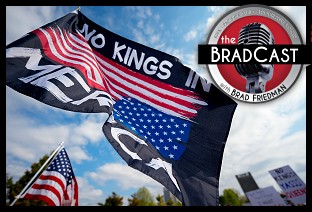 Celebrating 'No Kings': 'BradCast' 10/20/25
Celebrating 'No Kings': 'BradCast' 10/20/25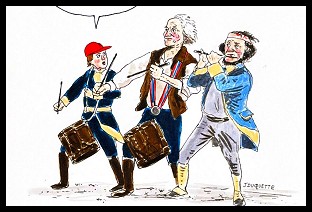 Sunday 'How It Started' Toons
Sunday 'How It Started' Toons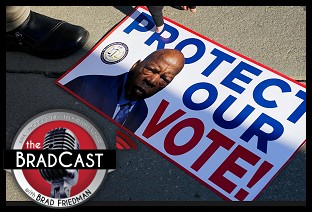 SCOTUS Repubs Appear Ready to Gut Rest of Voting Rights Act: 'BradCast' 10/16/25
SCOTUS Repubs Appear Ready to Gut Rest of Voting Rights Act: 'BradCast' 10/16/25 'Green News Report' 10/16/25
'Green News Report' 10/16/25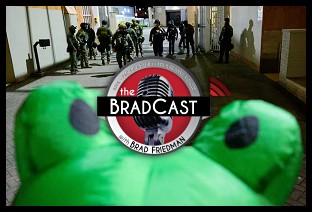 The 'Epstein Shutdown' and Other Autocratic Nightmares: 'BradCast' 10/15/25
The 'Epstein Shutdown' and Other Autocratic Nightmares: 'BradCast' 10/15/25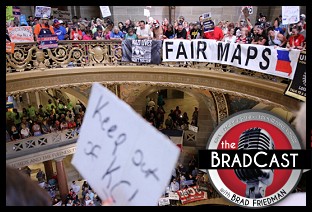 Group Vows to Block MO's GOP U.S. House Gerrymander: 'BradCast' 10/14/25
Group Vows to Block MO's GOP U.S. House Gerrymander: 'BradCast' 10/14/25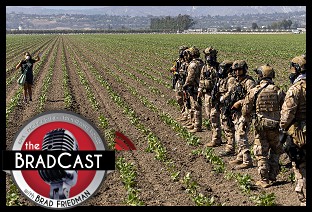 Trump Labor Dept. Warns Trump Policies Sparking Food Crisis: 'BradCast' 10/9/25
Trump Labor Dept. Warns Trump Policies Sparking Food Crisis: 'BradCast' 10/9/25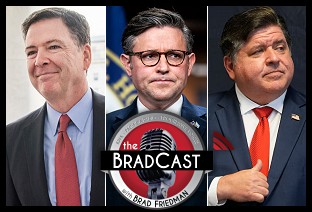 Trump's Losing Battles: 'BradCast' 10/8/25
Trump's Losing Battles: 'BradCast' 10/8/25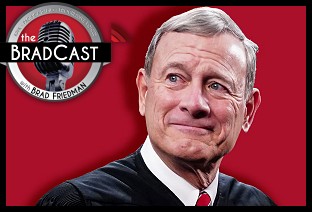 Trump, Roberts and His Stacked, Packed and Captured SCOTUS: 'BradCast' 10/7/25
Trump, Roberts and His Stacked, Packed and Captured SCOTUS: 'BradCast' 10/7/25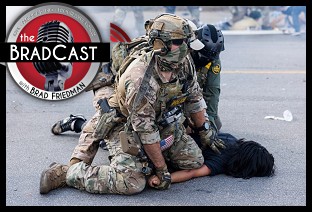 Trump Attempting His 'Invasion from Within': 'BradCast' 10/6/25
Trump Attempting His 'Invasion from Within': 'BradCast' 10/6/25 Biden Budget Expert: Mass Firings in Shutdown 'Illegal': 'BradCast' 10/2/25
Biden Budget Expert: Mass Firings in Shutdown 'Illegal': 'BradCast' 10/2/25 Why is DOJ Suing 'Blue' States for Their Voter Databases?: 'BradCast' 10/1/25
Why is DOJ Suing 'Blue' States for Their Voter Databases?: 'BradCast' 10/1/25
 VA GOP VOTER REG FRAUDSTER OFF HOOK
VA GOP VOTER REG FRAUDSTER OFF HOOK Criminal GOP Voter Registration Fraud Probe Expanding in VA
Criminal GOP Voter Registration Fraud Probe Expanding in VA DOJ PROBE SOUGHT AFTER VA ARREST
DOJ PROBE SOUGHT AFTER VA ARREST Arrest in VA: GOP Voter Reg Scandal Widens
Arrest in VA: GOP Voter Reg Scandal Widens ALL TOGETHER: ROVE, SPROUL, KOCHS, RNC
ALL TOGETHER: ROVE, SPROUL, KOCHS, RNC LATimes: RNC's 'Fired' Sproul Working for Repubs in 'as Many as 30 States'
LATimes: RNC's 'Fired' Sproul Working for Repubs in 'as Many as 30 States' 'Fired' Sproul Group 'Cloned', Still Working for Republicans in At Least 10 States
'Fired' Sproul Group 'Cloned', Still Working for Republicans in At Least 10 States FINALLY: FOX ON GOP REG FRAUD SCANDAL
FINALLY: FOX ON GOP REG FRAUD SCANDAL COLORADO FOLLOWS FLORIDA WITH GOP CRIMINAL INVESTIGATION
COLORADO FOLLOWS FLORIDA WITH GOP CRIMINAL INVESTIGATION CRIMINAL PROBE LAUNCHED INTO GOP VOTER REGISTRATION FRAUD SCANDAL IN FL
CRIMINAL PROBE LAUNCHED INTO GOP VOTER REGISTRATION FRAUD SCANDAL IN FL Brad Breaks PA Photo ID & GOP Registration Fraud Scandal News on Hartmann TV
Brad Breaks PA Photo ID & GOP Registration Fraud Scandal News on Hartmann TV  CAUGHT ON TAPE: COORDINATED NATIONWIDE GOP VOTER REG SCAM
CAUGHT ON TAPE: COORDINATED NATIONWIDE GOP VOTER REG SCAM CRIMINAL ELECTION FRAUD COMPLAINT FILED AGAINST GOP 'FRAUD' FIRM
CRIMINAL ELECTION FRAUD COMPLAINT FILED AGAINST GOP 'FRAUD' FIRM RICK SCOTT GETS ROLLED IN GOP REGISTRATION FRAUD SCANDAL
RICK SCOTT GETS ROLLED IN GOP REGISTRATION FRAUD SCANDAL VIDEO: Brad Breaks GOP Reg Fraud Scandal on Hartmann TV
VIDEO: Brad Breaks GOP Reg Fraud Scandal on Hartmann TV RNC FIRES NATIONAL VOTER REGISTRATION FIRM FOR FRAUD
RNC FIRES NATIONAL VOTER REGISTRATION FIRM FOR FRAUD EXCLUSIVE: Intvw w/ FL Official Who First Discovered GOP Reg Fraud
EXCLUSIVE: Intvw w/ FL Official Who First Discovered GOP Reg Fraud GOP REGISTRATION FRAUD FOUND IN FL
GOP REGISTRATION FRAUD FOUND IN FL

































